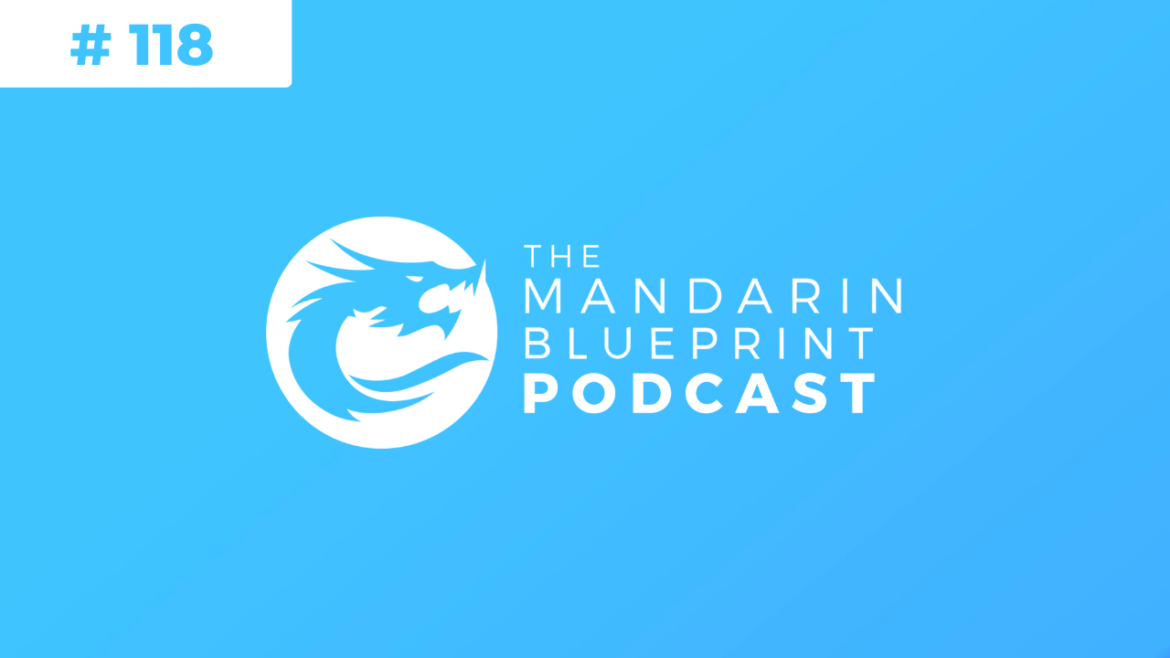
118. Shocking Native Mandarin Speakers
欢迎光临! Welcome!
You can now subscribe to the podcast by the links below, or you can subscribe by copying the following URL into your favorite podcast APP.
The Mandarin Blueprint Podcast focuses primarily on The Blueprint online curriculum. Creators Luke Neale & Phil Crimmins answer questions and comments, discuss topics related to China and Mandarin learning, and have special guests.
Want to learn how to speak fluent Chinese fast? Join our free Webinar right here.
欢迎光临! Welcome!
You can now subscribe to the podcast on iTunes, Stitcher, Spotify, or you can subscribe by copying the following URL into your favorite podcast APP:
https://www.mandarinblueprint.com/feed/podcast/
The Mandarin Blueprint Podcast focuses primarily on The Mandarin Blueprint Method online curriculum. Creators Luke Neale & Phil Crimmins answer questions and comments, discuss topics related to China and Mandarin learning, and have special guests.
0:00 Affiliate Link & Reviews
Become a Mandarin Blueprint Affiliate
Leave us a Google Business Review 🙂
2:24 Comments & Emails
Larry Cluff by Community
I have been studying Mandarin Blueprint in private for about 4 months and have learned pronunciation and about 100 words in Mandarin by studying 10-30 min a day. Last night I was with a Mandarin speaking friend. This was the first time I actually tried communicating with a true Mandarin speaker. He was shocked that I could write and speak so much in so little time! Honestly, I was surprised at how much I could recall and communicate! This program is awesome!
7:35
Bob Weiland by Community
This has to do with the Hanzi movie method. I’m afraid I got off to a bad start on this. I didn’t really focus adequately on my scenes because I already knew a lot of the elementary characters learned in a previously failed Chinese course. Now I’m paying the price, but am resolved to do it right!
I am finding it difficult sometimes to look at the Hanzi and thereby conjure up a specific scene. What I am experimenting with — and I would ask for some constructive criticism here if called for — is focusing first and foremost on the props that represent the hanzi itself. So far, this seems to be making the bridge to the actor, set, room, and keyword a little smoother.
Thanks
Bob
12:31
Jessica m by CommunityIt won’t let me post this question to the lesson (Yes it is the right phase three lesson)
Assuming the speaker is standing somewhere that isn’t in china, and talking about going to china next year, why is it:
我明年 来 中国.
and not
我明年 去 中国.
?Is just just about adding perfect aspect so it is kinda like future perfect tense?
15:33
Thomas Chernick by Email
Hi guys,
This popped up on Spotify today and you were my most listened to podcast this year. I just want to say how thankful I am for discovering MBP this year. You have me hope and interest during the pandemic that I gives me something fun and new to learn each day.
I know how hard it is to keep up as your business grows but I love how the course is growing and changing. thanks for everything you do and keep it up.
Stay well!
Tj Chernick
16:46
Becca G on Level 14 Complete
Well said Phil! “Remember you are reading a picture language. That’s amazing!” really struck me and I laughed because its true! The “squiggles” are now simply words to my eyes and that is both crazy and amazing to me. Chinese is endlessly fascinating, and I love how direct and “bare bones” it is. It gets right to the heart of what the words really mean, and that makes it interesting as heck. I love learning it, and even more so, love how you guys teach it!
17:42
John by Email
Hi,You mentioned that after we complete the intermediate level, we should be able to pass the HSK at level 4.
I’ve read that HSK is missing a lot of frequently used words. How did you come up with the vocabulary for your course?Also, do you have any estimate when you will have an advanced course?
Thanks,
John
22:30
David Hopwood by Email
Hi Luke,
Just to reassure you that my cancellation from MB is merely a pause. I had to travel unexpectedly overseas and simply don’t have the time or access. I’ll be back on when I return home.But thanks for this prompt: I am very impressed-very- with the quality of the course, not least the constant work you and Phil put into it. The recent reconfiguration is just an example. Your competitors seem to have produced material, adequate though it might be, and pretty much left it at that. You guys really do earn every dollar (£, E, yuan, whatever) so more power to you.
In the words of that great philosopher and humanitarian, Schwartzenegger, ‘I’ll be back.’Best regards
Dave Hopwood
25:56
Chad Ressler by Email
Hey guys,
Thought I would pass along a funny Chinese learner story. So, I like to play Battlefield 4 on PS4. Alot of the maps are set in China and in like cities and stuff. I cannot tell you the amount of times I have been killed lately by other players because I stop and am like “I know what that sign says!” Or “I know the characters on that building!”. ????
26:48
Becca G on 想法 in Context
Christopher’s comment about breaking it down to basics and then filling in the rest of the details was tremendously helpful in understanding the “people with ideas” line. That entire sentence tried to break my brain a little. Oddly the work one seemed to more or less make sense though? Some of these sentences are getting tougher to read! Not complaining at all, I love the challenge of it! It’s so rewarding being able to understand so many so far. Just proof that the MB really works!
29:17
Xiao En on New Vocabulary Unlocked! 认识
If these two characters are sitting next to each other in a sentence or a paragraph, how will I know if I have to take their meaning individually, or as one word? If that all makes sense.
33:17
Simon Stephens on Vocab Unlocked from 杯: 杯子 – 干杯
干杯 is a really useful one to understand. I’ve been here for over 2 years and I’ve heard this said often, so I soon understood that the meaning was to finish your drink. But…..until now I didn’t understand WHY you had to finish your drink.
Dry glass makes a lot of sense…….Thanks!
34:28
Oscar Haglund on Level 18 Complete
Today while I was reading for my kid I realised for the first time that I could actually not just intuit what it was about but that I could actually understand almost every single word (there was one character I did not know) of the first 3 pages. Now granted, this is properly a kids book but it was still a revelation that it could happen after less than one and a half
months of evening studies. Here are the first 3 pages in case anyone is curious:
谁来和我说晚安?
等一下爸爸马上快完了!
妈妈打完电话就过来!
36:28
Gavia Arctica on Vocab Unlocked from 银: 银行
To me this is a picture of Uncle Scrooge with a pile (or a row…. but I see a pile) of SILVER coins and a piggy bank (I guess that would be my very first association with the word “bank” when I was a child). He is doing his favorite activitity: counting is money by taking the silver coins from the pile (row) of coins and putting them one by one into the piggy bank, which is made out of transparent plastic so that I can all the time see that these are SILVER coins so that it´s impossible to forget that the coins inside the bank are made of silver.
38:59
Gavia Arctica on Vocab Unlocked from 服: 衣服 – 说服
When I googled “convincing speech” searching for an image for 说服 I got an old black and white image of a presidential debate and I think that works as a reminder for this word: lots of speeches and speaking with the purpose of convincing other people
39:35
Andrew Coleshill on 打电话 in Context
Hi,
I adjust trying to get my head around the difference between 打电话 and 打过电话。 What is the 过 doing in the 2nd one?
Cheers.
A: 我早上给你打过电话,但是你不在。B: 你是几点给我打的?
A: 十点。
B: 你给我打过几个电话?
A: 只打了一个。
42:56
Jason Pon on 页 in Context
Is there a measure word for 页? Doesn’t appear to be one here: 我写了几页
44:47
Jason Pon on 见面 in Context
Is 见面 like 说话 whereby you can place an infix to split it up? Is it because they are both ‘verb-noun’ verbs? Similar to how we’ve seen 说的话 we see 一次.
47:04
Micaela Ellison on 回来 in Context
Please explain the grammar for this sentence: 那你下周回得来回不来. Is it
similar to the “verb 不 verb” structure (e.g. 吃不吃 as in “eat-not eat”), except the meaning is possible (回得来)-not possible (回不来)? I understand an “or” is not needed, but would it be wrong to say 回得来还是回不来?
48:58 Movies!
This blog post explains the theory behind Movie Scenes and learning characters.
Ric Santos on Make a Movie 尊
Zu-actor outside the entrance of -en set, “horns” started coming out, after consuming 1″ inch off a bottle of baijiu, and he is now bowed down revering the bottle – elevated one inch on the table.
51:10
Ric Santos on Make a Movie 酷
In the backyard of his null set, Ku-actor emptied into the cow’s 牛 mouth口 a large bottle of 酉 baijiu. The meek cow then gave him a brutal kick and he landed the ground. Then drunken cow fell brutally on him with its full weight. Sometimes liquor can release the brute in the meek.
52:15
Will R on Make a Movie 感
KEYWORD: 感 gǎn To Emote (to show emotion in a way that makes it
very clear what you are feeling)
Actor: g-
Set: -an
Room within Set (tone): Living Room
Prop(s): 咸 (Salt Shaker), 心 (Heart)Make a movie:
1. g- at -an’s Living Room
2. g- loves Salt and is naturally a Salty person
3. g- picks up his Salt Shaker (咸) begins TO EMOTE out his love for salt as he eats it from the Salt Shaker
4. g- EMOTES his love for this Salt Shaker so clearly, that his Heart (心) begins to beat and shine so much out of his chest
5. Who would have thought a Salt Shaker could EMOTE (感) so much love from someone?
53:20
Will R on Make a Movie 钱
KEYWORD: 钱 qián Money
Actor: qi-
Set: -an
Room within Set (tone): Kitchen
Prop(s): 钅(Gold Bar), 戋 (Mace & Chain),Make a movie:
1. qi- at -an’s Kitchen
2. qi- needs some MONEY quick
3. qi- only has a single Gold Bar (钅), so she needs to break it down somehow
4. qi- grabs her Mace & Chain (戋) and uses it to smash the Gold Bar into loads of smaller Gold Coins (some real MONEY now)
5. qi- picks her MONEY (钱) up and goes shopping
54:26
Ric Santos on Make a Movie 酸
Su-actor in -an set outside the entrance puts Wine 酉 let to stand idle 夂 or brew for a long time 八 in vats厶 or jars to make sour vinegar! Seems like a lot of time wasted 夋, and it just turned sour.
55:27
Ric Santos on Make a Movie 波
Mr Bean as he extends his arm to open the entrance of -o set, observes his wrinkled 皮skin resemble the ripples and small waves of the water’s 氵surface 皮 on the sea.
56:12
Ric Santos on Make a Movie 泳
There is a a kind of a never-ending cycle 永 of actions when you swim 泳 in the water 氵. Sink or swim.
56:42
Ric Santos on Make a Movie 脉
M-actor is a professional boxer and trains in the backyard of his -ai set. After jogging a mile (mài) , he took his pulse and felt the never-ending cycle 永 of blood flow in his blood vessels月.
58:08
Georg Lohrer on Make a Movie 亲
It rains heavily as my qi-actor arrives in front of my en-location. She carries a big urn with the ashes of all her RELATIVES. Due to the rain, the urn is very slippery and glides out of her hands. The urn crashes on the ground and cracks open.
All the ash gets exposed to the rain. qi-actor is desperate and tries to protect her RELATIVES’ ash from the rain. She takes a big leaf from a nearby tree and shields the ash. Otherwise, her RELATIVES’ ash would get drowned in the canalization.
59:11
Ric Santos on Make a Movie 游
Yi-Actor as a child 子 brings 方 her sleeping ? bag to travel around, sometimes she inflates the sleeping ? bag and swims 游 wading across the river 氵.
59:53
Ric Santos on Make a Movie 施
When traveling 方? with another 也, you will need to plan to carry each other along. And also 也 – carry 施 out a plan together…


